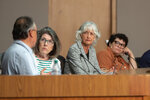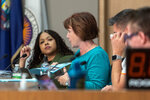


WEDNESDAY, July 17 — Changing the makeup of the Lansing City Council was a popular topic last night at the biweekly Charter Revision Commission at City Hall.
Seven of 11 citizens appearing for public comment weighed in on whether the commission should expand the number of ward-based seats or retain the existing setup of four wards and four at-large positions.
Five called for eliminating at least some at-large seats and adding more wards. Some also suggested expanding the number of Council seats to nine or more.
“I would really like to see the influence of money in the city be restricted by going more to a ward system,” resident Owen Handy said.
Handy cited the cost of winning an at-large seat citywide as too high for many people who may otherwise be considered qualified.
“You have somebody like Roberto Pena who walked and knocked literally every single door in his county commission race to win against a much better-funded incumbent," Handy said.
“That sort of upset doesn't really happen when you when the bar to entry is $50,000. You have to be able to fundraise among people who can give you more than $50 or $100 at a time, and that shuts out a lot of people who happen to have a good amount of experience and can bring a lot of responsiveness to Council.”
He argued that more ward seats would encourage greater representation.
Churchill Downs Community Association President Jay West and Eaton County-based Lansing resident Linda Appling thought the city should keep its existing Council makeup.
West called at-large members a "failsafe."
"If you can't get a hold of the person in your area, you can go to one of the at-large members,” West said.
Commissioner Joan Bauer said she recognized how important the potential change is to residents.
“We are very well aware that the people of our city are really all over the map when it comes to opinions on the structure,” Bauer said.
Commissioner Liz Boyd said she has “major questions about the makeup of the Council, whether it's eight people or seven people and nine people. I'm just saying that going down in the future, those are things I'm really looking for.”
Commissioner Jody Washington noted that she had “a lot of suggestions” for Article 2, which covers the Council’s makeup, but added that she didn’t intend to mention all of them until the commission was actually ready to start discussing potential changes in full this fall.
“I'm going to be waiting until we actually get into the ditch of it. So, I don't want my silence during these simple review procedures to be misconstrued as I have nothing to say, because you know me, and I have plenty to say,” Washington said.
Commissioners also listened to a handful of public speakers who cited issues with the eligibility requirements for holding an elected public office. Under Article 2, section 103, anyone convicted of a felony “shall not be eligible to hold any city office for a period of 20 years from the date of conviction.”
Julie Vandenboom, a candidate who finished one spot shy of winning a commission seat in May, said this portion did not comply with state law.
She cited Article 11, Section Eight of the state Constitution, which states that an officeholder may only be barred if “the conviction was related to the person's official capacity while the person was holding any elective office or position of employment in local, state or federal government.”
“I see no reason for Lansing’s charter to contain language that’s more restrictive than what's in the Michigan State Constitution,” Vanderboom said.
“Barring an individual who has committed any felony within the past 20 years, rather than barring only those who meet the more limited criteria delineated in the Constitution, is just putting up another barrier for folks who are leaving incarceration,” she added. “Our neighbors who are returning citizens already face discrimination trying to find employment, trying to find housing. Let's not unnecessarily bar them from public service as well.”
While West disagreed with Vandenboom on adding ward seats, he said he was with her on this issue.
“The people that went to jail did their time. They were released, but there are still chains on them — mental chains. Changing this law would remove some of those mental chains and maybe make us be viewed as more of a forgiving city. I feel like in a democracy we should remove or reduce that requirement,” West said.
Boyd agreed with them.
“That is something I definitely want to look at. At minimum, the city should be following what the state is doing. I think 20 years is a lot and too much,” she said.
In other business, the commission discussed the policy for appointing emergency mayor powers if a mayor cannot perform his or her duties or is removed from office.
“Under the charter, the president of the City Council shall be considered as a temporary mayor of the city,” Chair Brian Jeffries explained. “There's always been a pushback on that, at least from the Mayor's Office, so there should probably be some discussion with that.”
Vice Chair Lori Adams Simon asked what the role of the deputy mayor was, to which Washington noted that the position is not outlined under the existing charter.
“We shouldn't have a deputy mayor, keeping in mind that, in my opinion, it was instituted to circumvent what’s in the charter. So, that's definitely something we'll have to look at,” Washington said.
Shelbi Frayer resigned this month as deputy mayor. Her replacement was given a different title.
While the body won’t make any active changes to the charter during this initial, line-by-line review of each article and section, Jeffries said it was important to inform the public of what the document entails.
“We need to hear from the people first before we start really getting into the meat of things. And this is an opportunity to hear from them, but also to begin the review process,” Jeffries said.
The commission will reconvene at City Hall at 5 p.m. Tuesday to interview representatives from a pair of firms that responded to a request for proposals for legal consultation.
Support City Pulse - Donate Today!
Comments
No comments on this item Please log in to comment by clicking here